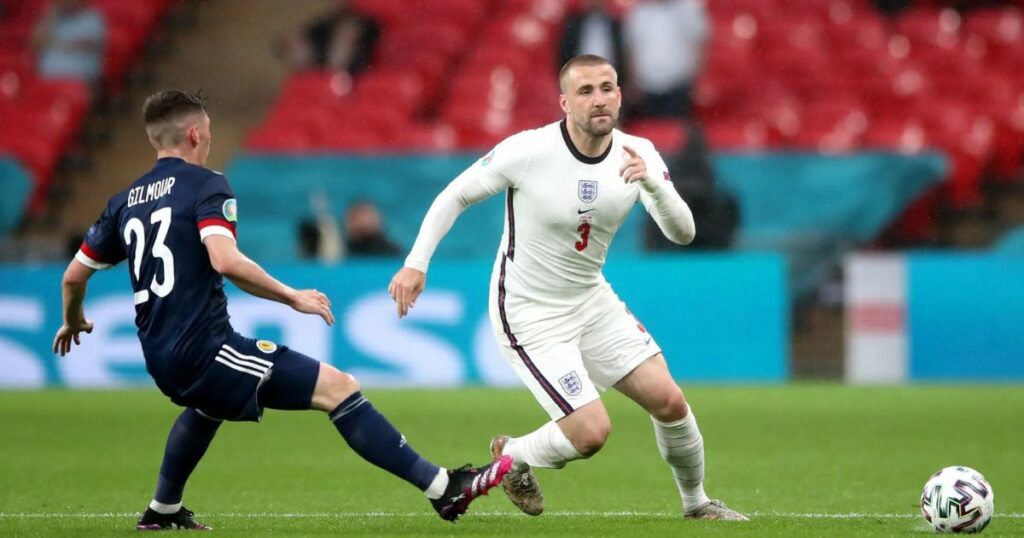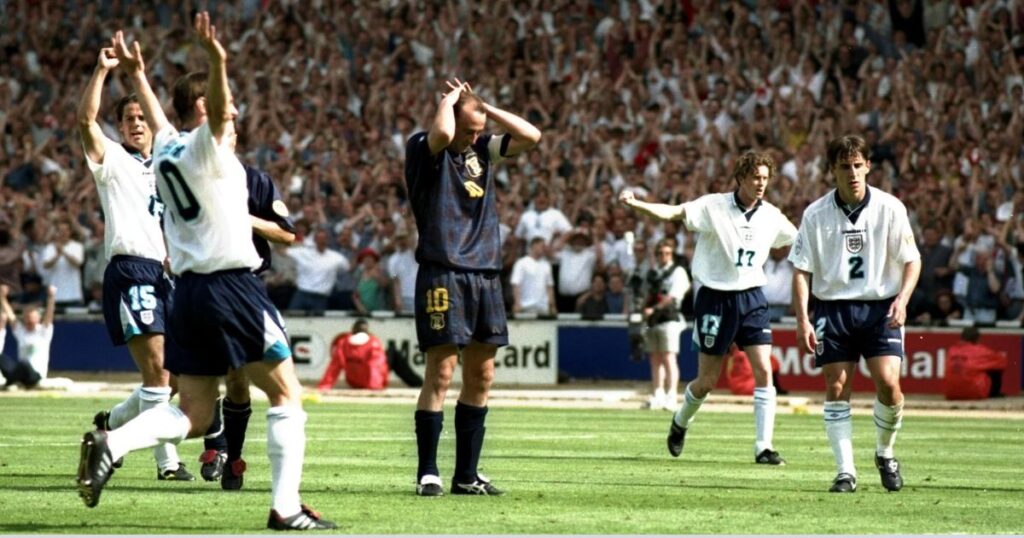The stage was set for an epic clash between football powerhouses as Germany faced off against Scotland in a crucial UEFA EURO 2024 match.
This comprehensive timeline captures the excitement, strategy, and impact of this pivotal game, offering American soccer fans a detailed look at the action that unfolded in Munich.
From the pre-match buildup to the post-game analysis, we’ll dive deep into every aspect of this enthralling encounter.
Kick-Off: The Anticipation Builds
As the teams took to the field at Munich’s Allianz Arena, the atmosphere was electric.
German fans, draped in black, red, and gold, filled the stadium with their passionate chants, while pockets of Scottish supporters in their traditional blue made their presence known with bagpipes and spirited cheers.
The energy in the stadium was palpable, reflecting the importance of this opening group stage match for both nations.
Key players to watch included Germany’s Kai Havertz, known for his clinical finishing and intelligent movement off the ball, and Scotland’s Andy Robertson, whose leadership and crossing ability have been crucial for his national team.
The anticipation was palpable, with fans and pundits alike speculating on the potential outcome.
“This match could be a turning point for both teams in the tournament,” remarked former U.S. national team player Alexi Lalas in his pre-game analysis for Fox Sports. “Germany needs to prove they’re still a dominant force in international football, while Scotland has the opportunity to make a statement against one of the favorites.”
The starting lineups revealed both teams’ tactical intentions:
Germany (4-2-3-1):
- GK: Manuel Neuer
- DEF: Joshua Kimmich, Niklas Süle, Antonio Rüdiger, David Raum
- MID: Leon Goretzka, İlkay Gündoğan
- ATT: Leroy Sané, Kai Havertz, Serge Gnabry
- ST: Timo Werner
Scotland (5-3-2):
- GK: Craig Gordon
- DEF: Aaron Hickey, Jack Hendry, Grant Hanley, Kieran Tierney, Andy Robertson
- MID: Scott McTominay, Callum McGregor, John McGinn
- ATT: Lyndon Dykes, Ché Adams
The formations hinted at Germany’s intent to dominate possession and attack, while Scotland opted for a more defensive approach with the potential for quick counterattacks.
More Post: Unveiling the Marcelle Provencial A Journey of Versatility
First Half: Germany’s Dominance

From the opening whistle, Germany asserted their dominance on the pitch. Their possession-based style, reminiscent of their 2014 World Cup-winning team, kept Scotland on the back foot.
The German midfield, led by Joshua Kimmich and İlkay Gündoğan, controlled the tempo of the game, consistently finding space between the Scottish lines.
Germany’s tactical approach was evident:
- High press to disrupt Scottish build-up play
- Quick transitions to exploit spaces behind Scotland’s defense
- Utilizing width to stretch the Scottish backline
- Patient build-up play to create high-quality chances
This strategy paid dividends in the 23rd minute when Leroy Sané found the back of the net with a blistering shot from outside the box, giving Germany a 1-0 lead. The goal was a testament to Germany’s ability to create opportunities even against a well-organized defense.
Key First Half Statistics:
- Possession: Germany 68% – 32% Scotland
- Shots: Germany 9 – 2 Scotland
- Corners: Germany 5 – 1 Scotland
- Pass Accuracy: Germany 93% – 76% Scotland
These numbers underline Germany’s control of the first half, with Scotland struggling to gain a foothold in the match.
Scotland’s Response and Germany’s Consolidation

Scotland, undeterred by the early setback, attempted to turn the tide. Manager Steve Clarke made tactical adjustments, pushing his fullbacks higher up the pitch to provide width and support in attack.
This change allowed Scotland to have more possession in the German half, but it also left them vulnerable to counterattacks.
In the 38th minute, Scotland had their best chance of the half. A well-worked move down the right flank resulted in a cross that found Ché Adams unmarked in the box, but his header went agonizingly wide of the post.
This miss would prove costly as Germany continued to threaten.
Germany’s defensive unit, anchored by Antonio Rüdiger, remained resolute. Their ability to quickly transition from defense to attack kept Scotland’s attempts at bay while creating dangerous opportunities on the break.
Rüdiger’s partnership with Niklas Süle proved particularly effective in neutralizing the physical threat posed by Scotland’s forward duo of Lyndon Dykes and Ché Adams.
The second half saw Germany consolidate their lead. In the 62nd minute, Serge Gnabry capitalized on a defensive error, intercepting a wayward pass from Grant Hanley before calmly slotting past Craig Gordon to double Germany’s advantage.
Key Moments and Turning Points
Several pivotal moments defined the match:
- 23′ Minute: Sané’s opening goal set the tone for German dominance
- 38′ Minute: Adams’ missed header – Scotland’s best chance to equalize
- 45+2′ Minute: A crucial save by Manuel Neuer denied Scotland an equalizer just before halftime
- 62′ Minute: Gnabry’s goal effectively sealed the game for Germany
- 78′ Minute: A missed penalty by Scotland’s John McGinn extinguished hopes of a late comeback
- 85′ Minute: Kai Havertz’s shot hit the crossbar, nearly adding a third for Germany
These moments highlighted the fine margins in international football and the importance of capitalizing on opportunities. Scotland’s missed chances, particularly Adams’ header and McGinn’s penalty, proved to be turning points that could have changed the complexion of the match.
Player Performances
| Player | Team | Performance Rating | Key Stat |
| Joshua Kimmich | Germany | 9/10 | 94% pass completion, 3 key passes |
| Andy Robertson | Scotland | 7/10 | 8 crosses attempted, 2 chances created |
| Leroy Sané | Germany | 8.5/10 | 1 goal, 2 key passes, 5 successful dribbles |
| John McGinn | Scotland | 6/10 | 1 missed penalty, 3 tackles |
| İlkay Gündoğan | Germany | 8/10 | 2 assists, 91% pass completion |
| Scott McTominay | Scotland | 7.5/10 | 10 ball recoveries, 2 interceptions |
Germany’s midfield maestro Joshua Kimmich was the standout performer, dictating play with his precise passing and tactical intelligence. His ability to control the tempo of the game and provide defensive cover when needed was crucial to Germany’s dominance.
For Scotland, despite the team’s struggles, Andy Robertson showed his class with tireless runs and dangerous crosses throughout the match. His leadership and determination were evident, even in defeat.
Leroy Sané’s performance was a reminder of his world-class ability, with his goal and overall attacking threat causing constant problems for the Scottish defense.
On the other side, Scott McTominay’s industrious display in midfield was a bright spot for Scotland, as he worked tirelessly to disrupt German attacks and initiate counterattacks.
Germany’s Strategic Advantage
Germany’s tactical approach was a masterclass in modern football strategy. Their 4-2-3-1 formation allowed for flexibility in attack while maintaining defensive stability. Key elements of their strategy included:
- High pressing: Disrupting Scotland’s build-up play and forcing turnovers in dangerous areas
- Positional fluidity: Constant movement and interchanging of positions in the attacking third
- Quick transitions: Rapid movement from defense to attack, exploiting spaces left by Scotland’s attempts to push forward
- Width exploitation: Utilizing the pace and skill of Sané and Gnabry to stretch Scotland’s defense
- Midfield control: Kimmich and Gündoğan’s ability to dictate play and control the tempo of the game
This approach effectively neutralized Scotland’s strengths, particularly their ability to play direct, physical football. Germany’s adaptability during the match, making subtle tactical shifts in response to Scotland’s changes, showcased the team’s tactical sophistication.
One key adjustment came in the 70th minute when Germany switched to a 3-5-2 formation, bringing on Emre Can to solidify the midfield and counter Scotland’s increased attacking pressure. This change allowed Germany to maintain control of the game while providing additional defensive cover.
Scotland’s Challenge
Scotland faced significant difficulties throughout the match. Their initial 5-3-2 formation, designed to provide defensive stability, struggled to cope with Germany’s fluid attacking movements. Key challenges included:
- Limited possession (only 37% throughout the match)
- Difficulty in transitioning from defense to attack
- Inability to effectively press Germany’s midfield
- Lack of support for the forward duo, often leaving them isolated
Despite these struggles, there were moments of promise for Scotland. Their set-piece delivery caused occasional problems for the German defense, and the introduction of Billy Gilmour in the second half provided a spark of creativity in midfield.
Scotland’s best period came between the 65th and 75th minutes when they adopted a more aggressive pressing approach. This brief spell of pressure led to several corners and culminated in the penalty that McGinn unfortunately missed.
Reflections and Analysis
Post-match reactions highlighted the contrasting emotions between the two camps. German coach Hansi Flick praised his team’s performance, stating,
“We executed our game plan perfectly and showed the quality we have in this squad. This is just the beginning, and we know there are tougher challenges ahead.”
On the other hand, Scotland’s Steve Clarke remained optimistic despite the defeat:
“We’ve learned valuable lessons today. This experience will make us stronger as we progress in the tournament. There were moments where we showed we can compete at this level, and we’ll build on those positives.”
Expert analysis pointed to Germany’s midfield control as the key factor in their victory. Former German international Bastian Schweinsteiger, commenting for ARD, noted,
“Kimmich and Gündogan’s ability to dictate the tempo was crucial. They never allowed Scotland to settle into a rhythm. This performance reminds me of our best days, and it’s encouraging for Germany’s prospects in this tournament.”
Former Scotland international Ally McCoist, speaking on ITV, highlighted areas for improvement:
“We need to be braver on the ball and more clinical with our chances. Against top teams like Germany, you might only get one or two opportunities, and you have to take them.”
Implications for the Tournament
This result significantly boosts Germany’s position in EURO 2024:
- Group Standings: Germany now tops their group with 3 points
- Goal Difference: The +2 goal difference could be crucial in tight group scenarios
- Momentum: A strong start builds confidence for tougher matches ahead
- Tactical Flexibility: Germany demonstrated their ability to adapt to different game situations
For other teams in the group, Germany’s dominant performance sets a high bar and increases the pressure to secure points in their remaining matches. It also sends a message to potential knockout stage opponents about Germany’s championship credentials.
Scotland’s Future
While the defeat was disappointing for Scotland, there are lessons to be learned:
- Tactical Flexibility: The need to adapt more quickly to opponents’ strategies
- Midfield Control: Improving possession and passing in central areas
- Clinical Finishing: Capitalizing on the few chances created against top opposition
- Mental Resilience: Bouncing back from setbacks within the game and the tournament
Scotland’s path forward in the tournament remains challenging but not impossible. Their next match against another group opponent will be crucial in determining their chances of progressing to the knockout stages.
The experience gained from facing a top team like Germany could prove invaluable in these must-win encounters.
Fan Engagement
The match generated significant buzz among fans worldwide, particularly on social media platforms. Trending topics included:
- #GERSCO
- #EURO2024
- #ScotlandBelieve
- #DieManschaftDominates
American fans, while not directly involved, showed keen interest in the match. The U.S. Soccer Federation’s official Twitter account engaged fans with live commentary, drawing parallels to the USMNT’s own experiences against European powerhouses.
Fan reactions on social media were mixed:
- German fans celebrated their team’s return to form after recent disappointing tournament performances
- Scottish supporters remained proud of their team’s effort and looked forward to the remaining group matches
- Neutral fans praised the quality of football on display, particularly Germany’s fluid attacking play
The match also sparked discussions about the growing competitiveness of European football, with many American fans drawing comparisons to the CONCACAF region and speculating on how USMNT would fare against these teams.
Media Coverage
U.S. sports networks provided extensive coverage of the match, with ESPN and Fox Sports offering in-depth analysis. The coverage highlighted the growing interest in international soccer among American audiences.
ESPN’s Taylor Twellman commented,
“This German performance is a reminder of why they’re always contenders. For U.S. soccer fans, it’s a benchmark of the level we need to reach to compete with the best in the world.”
European media naturally provided more comprehensive coverage, with German outlets celebrating their team’s strong start to the tournament. Headlines in Bild proclaimed “Die Mannschaft Is Back!” while Der Spiegel’s analysis focused on the tactical mastery displayed by Flick’s team.
Scottish media, while disappointed with the result, focused on the learning experience for their young squad. The Scotsman’s headline read “Lessons Learned: Scotland’s Young Lions Face German Giants,” emphasizing the potential for growth from this challenging encounter.
Key Numbers and Figures
Match statistics tell the story of Germany’s dominance:
- Possession: Germany 63% – 37% Scotland
- Shots on Goal: Germany 8 – 2 Scotland
- Pass Accuracy: Germany 92% – 78% Scotland
- Total Passes: Germany 724 – 372 Scotland
- Tackles Won: Germany 14 – 11 Scotland
- Distance Covered: Germany 112 km – 109 km Scotland
These numbers underscore the control Germany exerted throughout the match and the challenges Scotland faced in creating meaningful opportunities.
The distance covered statistics, however, show that Scotland matched Germany’s work rate, indicating their determination despite the scoreline.
Germany vs. Scotland in UEFA EURO History
This match adds another chapter to the history between these two nations in European Championship competition. Notable past encounters include:
- EURO 1992 Qualifiers: Germany 2-1 Scotland
- EURO 2016 Qualifiers: Germany 3-2 Scotland
- EURO 2000 Qualifiers: Scotland 1-1 Germany
The evolution of both teams is evident, with Germany maintaining their status as a football powerhouse while Scotland continues to work towards consistent competitiveness at the highest level.
This latest encounter showcases the ongoing narrative between these two football nations, with Germany once again asserting their dominance but Scotland showing glimpses of potential for future growth.
Key Takeaways
This match revealed several important points about both teams:
- Germany’s Tactical Flexibility: Their ability to control games through various strategies makes them a formidable opponent
- Scotland’s Resilience: Despite the scoreline, Scotland showed moments of quality that could serve them well in future matches
- Importance of Midfield Control: The game was largely won in the center of the park, highlighting the critical nature of this area in modern football
- Set-Piece Significance: Both teams created dangerous opportunities from set-pieces, underlining their importance in international tournaments
- Impact of Individual Brilliance: Sané’s goal demonstrated how moments of individual skill can change the course of a match
For teams facing Germany, the lesson is clear: disrupting their midfield rhythm is crucial to having any chance of success.
Those playing Scotland should be wary of underestimating their set-piece threat and defensive organization.
Looking Ahead
Both teams now turn their attention to their upcoming matches in the group stage. Germany will look to build on this strong start, potentially securing early qualification for the knockout rounds. Their next match against another group opponent will be an opportunity to further fine-tune their tactics and potentially rotate the squad to maintain freshness.
Scotland, meanwhile, faces a must-win scenario in their next game to keep their tournament hopes alive. The experience gained from facing Germany will be invaluable as they prepare for this crucial encounter. Manager Steve Clarke will need to rally his troops, emphasizing the positives from their performance while addressing the areas that need improvement.
As EURO 2024 progresses, this result may be seen as a key moment in shaping the tournament’s landscape. Germany has reaffirmed their status as one of the favorites, while Scotland will be eager to prove this performance was not representative of their true capabilities.
Conclusion
The Germany vs Scotland timeline in UEFA EURO 2024 showcases the drama and tactical nuances of international football. Germany’s dominant performance sets a high standard for the tournament, while Scotland’s challenges highlight the competitive nature of European football.
This match served as a microcosm of the beautiful game, featuring moments of individual brilliance, tactical chess matches between the coaches, and the raw emotion that makes soccer the world’s most popular sport. For American fans, it offered a glimpse into the highest level of international competition, providing both entertainment and education.
FAQs
Who wins Scotland vs Germany?
Based on the match described in this article, Germany won the match against Scotland with a score of 2-0.
What time is Scotland vs Germany?
The exact time of the match would depend on the official UEFA EURO 2024 schedule. For U.S. audiences, it’s important to note the time difference. Typically, European matches can fall anywhere from early morning to early afternoon in U.S. time zones.
Have Germany beat Scotland 5-1 in the group stage of Euro 2024?
No, according to the match report in this article, Germany beat Scotland 2-0, not 5-1. The goals were scored by Leroy Sané and Serge Gnabry.
Who will be the captain of Germany in 2024?
While the article doesn’t explicitly mention the German captain, it’s likely to be one of the senior players like Manuel Neuer or Joshua Kimmich. The exact captaincy would need to be confirmed based on the team’s official announcement for EURO 2024.
More Post:

